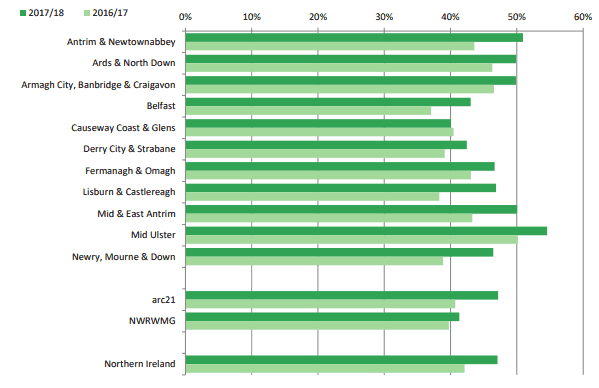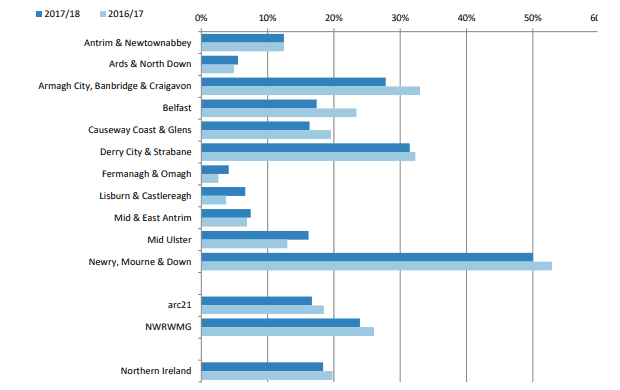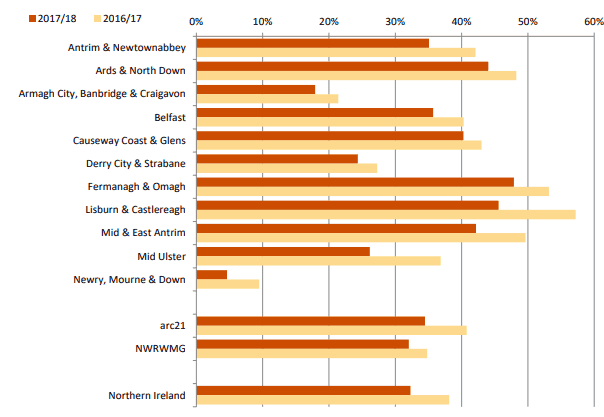Northern Ireland’s quarterly waste statistics have shown a 5% increase in composting and recycling rates compared to the same period 12 months earlier, which has largely been put down to mandatory food waste collections.
The statistics, which were compiled by the Department of Agriculture, Environment and Rural Affairs (Daera), show the recycling and composting rate was 47.1% between October and December 2017.
This is an exact 5% rise from the same period last year, although down from the 51.5% achieved in the previous quarter from July-September 2017 (see letsrecycle.com story).
However, a drop from the third quarter to the fourth often occurs due to factors such as increased gardening waste used for composting during the summer months, according to Daera.
Food waste
From April 2017, it became a statutory requirement for all councils in Northern Ireland to provide each household with a container for food (potentially with other bio-waste) to enable its separate collection.
As outlined in the graph above, this led to the vast majority of councils reporting an increased recycling rate the following year. Causeway Coast & Glens was the only one not to do so, recording 40.1% in 2017, down from 40.5% the year before. The council also recorded the lowest overall recycling rate.
Lisburn & Castlereagh increased their recycling rate by 8.6 percentage points, the highest increase of all.
The highest household waste recycling rate was recorded in Mid Ulster at 54.6%, an improvement of 4.4 percentage points on the figure recorded in the same quarter last year.
In total, Northern Ireland’s councils collected 232,004 tonnes of LAC municipal waste between October and December 2017, 1.7% higher than the 228,145 tonnes collected during the same three months of 2016. The statistics also added that household waste accounts for 89.3% of total LAC municipal waste.
Energy recovery
Along with the 47.1% recycling or composting rate, a further 18.4% of Northern Ireland’s waste was sent for energy recovery, down from 19.8% the year before.
As outlined in the table above, some local authorities reduced the amount they sent for energy recovery but there were some with increases.
The highest LAC municipal waste energy recovery rate was recorded in Newry, Mourne & Down at 50.0%. The lowest rate recorded was 4.1% in Fermanagh & Omagh, though this was 1.6 percentage points higher than the 2.6% sent for energy recovery between October and December 2016.
The tonnages relating to energy recovery from material undergoing anaerobic digestion are still accounted for under the recycling section since the vast majority of the tonnage of waste undergoing this process eventually ends up as a compost (once the methane generated from the anaerobic digestion process has been collected).
Landfill
The quantity of LAC municipal waste sent to landfill decreased by 12.8% from 88,159 tonnes during October to December 2016 to 76,846 tonnes between October and December 2017.
This gave a quarterly landfill rate of 33.1% for the most recent quarter which was lower than the 38.6% recorded during the same quarter of 2016.
All councils recorded a decrease in their household landfill rate in October to December 2017 compared to same three months last year. Decreases ranged from 11.6 percentage points in Lisburn & Castlereagh to 2.7 percentage points in Causeway Coast & Glens.
The report stated: “Increased recycling rates due to the statutory requirement for all councils in Northern Ireland to provide households with a container for food to enable its separate collection contributed to the drop in landfill rates, though increasing energy recovery rates for some councils also contributed.”
Useful links:
The post Food waste ‘boost’ to Northern Ireland’s recycling rate appeared first on letsrecycle.com.
Source: letsrecycle.com General





